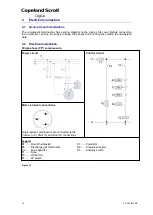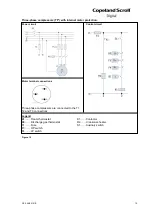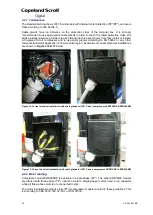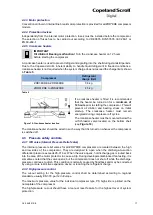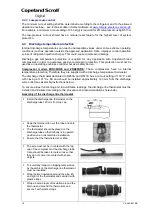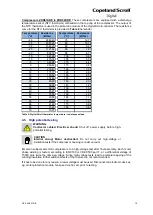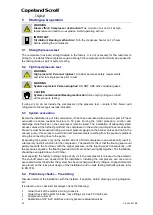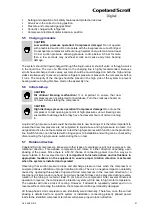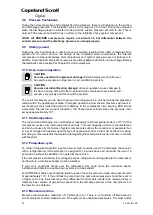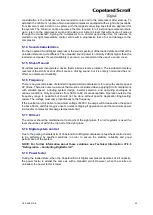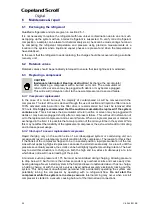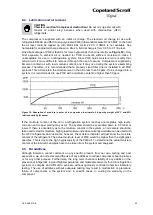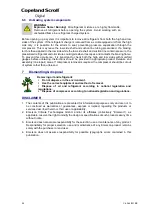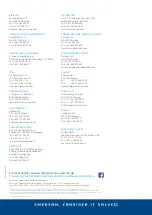
C6.2.44/0219/E
13
Individual system tests should be performed to verify acceptability of sound performance. If
adequate attenuation is not achieved, use a muffler with a larger cross-sectional area to inlet area
ratio. A ratio of 20:1 to 30:1 is recommended. A hollow shell muffler will work quite well. Locate
the muffler at minimum 15 cm to maximum 45 cm from the compressor for the most effective
operation. The farther the muffler is placed from the compressor within these ranges, the more
effective. Choose a muffler with a length of 10 to 15 cm.
3.10 Suction line noise and vibration
Copeland Scroll compressors inherently have low sound
and vibration characteristics. However in some respects
the sound and vibration characteristics differ from
reciprocating compressors and in rare instances could
result in unexpected sound generation. One difference is
that the vibration characteristic of the scroll compressor,
although low, includes two very close frequencies, one of
which is normally isolated from the shell by the suspension
of
an
internally-suspended
compressor.
These
frequencies, which are present in all compressors, may
result in a low-level "beat" frequency that can be detected
as noise coming along the suction line into the building
under some conditions. Elimination of the beat can be
achieved by attenuating either of the contributing
frequencies. This is easily done by using one of the
common
combinations
of
recommended
design
configurations. The scroll compressor makes both a rocking and twisting motion and enough
flexibility must be provided in the line to prevent vibration transmission into any lines attached to
the unit. In a split system, the most important goal is to ensure minimal vibration in all directions
at the service valve to avoid transmitting vibrations to the structure to which the lines are fastened.
A second difference of the Copeland Scroll compressor is that under some conditions the normal
rotational starting motion of the compressor can transmit an "impact" noise along the suction line.
This may be particularly pronounced in three-phase models due to their inherently higher starting
torque. This phenomenon, like the one described previously, also results from the lack of internal
suspension and can be easily avoided by using standard suction line isolation techniques as
described below. The sound phenomena described above are not usually associated with
reversible air conditioning / heat pump systems because of the isolation and attenuation provided
by the reversing valve and tubing bends.
Recommended configuration
▪
Tubing configuration: ........small shock loop
▪
Service valve: ..................."angled valve" fastened to unit / wall
▪
Suction muffler: .................not required
Alternative configuration
▪
Tubing configuration: ........small shock loop
▪
Service valve: ..................."straight through" valve fastened to unit / wall
▪
Suction muffler: .................may be required (acts as dampening mass)
Figure 13 Suction tube design
















